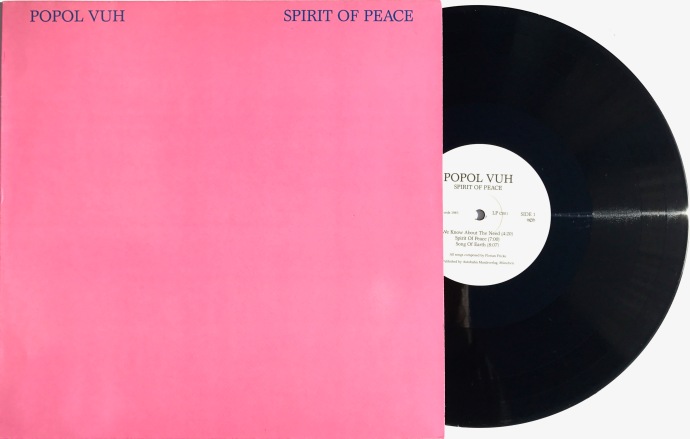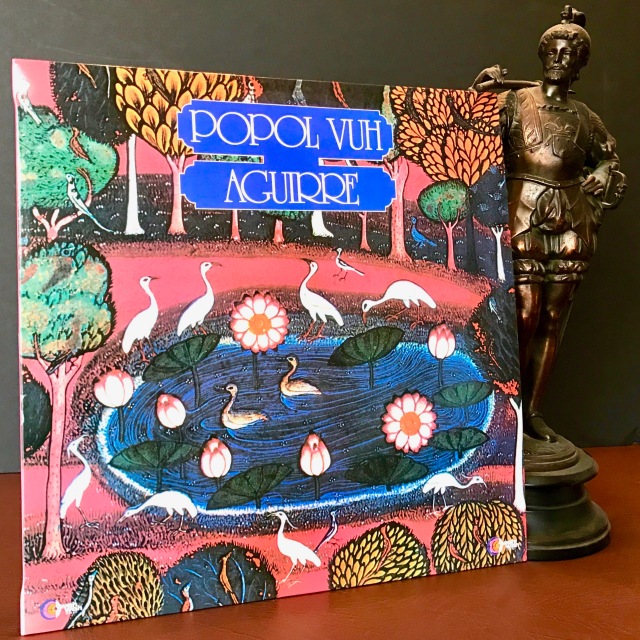There was a poster I recall seeing many years ago that captured those difficult times with insight and humour. It came to mind this week.

The quote is variously attributed to Ashleigh Brilliant, Aunty Acid, Jennifer Yane and Author Unknown. I reckon it’s Brilliant.
As one does in trying times, I turned to music. Something relaxing to unwind the knots and lumps that seemed to be jerking around inside like punks in a mosh pit.
But oddly, my favourite oasis albums (one of which was recently revisited here) did not quite do the job. Certainly the percussionless drift of much electronic music was appealing, but somehow I was seeking an injection of humanity. Something organic, corporeal, vulnerable by virtue of the very mortality of its creators.
The worldly hope men set their hearts upon
Turns ashes—or it prospers; and anon,
Like snow upon the desert’s dusty face
Lighting a little hour or two—is gone [XIV]^

Long gone—never known other than by her writing and music—is one of the great voices of the Middle Ages. Listening to Gothic Voices sing the music of Abbess Hildegard von Bingen, pure, unaccompanied by anything other than an occasional reedy drone, is indeed a transporting experience. This glorious plainsong—simple unison lines and a kind of ecclesiastical call-and-response—takes the listener direct to a medieval church to kneel, solemn and penitent, in the face of a heavenly purity of voice. Aptly titled A Feather on the Breath of God, this is a wonderful album. But not what I’m seeking right now. I have to be in a church in a couple of days; the drafts chill me already.
Then to the rolling Heav’n itself I cried,
Asking, “What lamp had Destiny to guide
Her little children stumbling in the dark?”
And—“A blind understanding!” Heav’n replied [XXXIII]

Jumping forward almost a millennium, the neo-classical work of Christian Saint-Preux Langlade sprang to mind. Known simply as Saint-Preux, the composer gained some fame with his album Concerto pour une voix (1969), known simply as Concerto. It is a lush, romantic work, where a theme stated with delightful 60s lava-lamp curvature by a female voice is explored through different variations and timbres across the album. The trumpet version could be from a Peter Greenaway romp (if you can imagine that) while the piano led variation could be a quiet interlude from Ken Russell’s Lisztomania. When the drum kit joins the orchestra there is a lift in energy, when Saint-Preux pulls it back for some reflective piano, it soothes. Everything flows delightfully, cinematically; baroque psychedelia that pleases but—today, at least—does not provide the sanctuary I seek. This is music for consuming life, for sharing, for celebration.
Here with a loaf of bread beneath the bough,
A flask of wine, a book of verse—and though
Beside me singing in the wilderness—
An wilderness is paradise enow [XI]
Both albums feature the human voice, clearly that’s an element I’m seeking. But not in verses or lyrics. It’s the sound I crave, integrated into instrumental calm. And those instruments must be primarily acoustic…
Popol Vuh!
Formed by pianist composer Florian Fricke at the end of the 60s and named after a Mayan book of mythology, Popol Vuh (Fricke with a variety of collaborators and musicians) produced a significant body of music in the 70s and 80s. Interestingly, in the language of the Quiché Maya people Popol Vuh ‘translates as “Book of the Community”, “Book of Counsel”, or more literally as “Book of the People”‘ (Wikipedia).
I love the first album, Affenstunde, a 1970 proto-space drift for Moog and pattering percussion. And I often play the more muscular Einsjäger und Siebenjäger (1974). What is more, when Wah-Wah records re-issued a number of titles a year or so back, I smashed the piggy bank to land a few. But today I don’t want muscle, don’t want ecstasy, electronics or big dynamics. Today I am spinning Spirit of Peace from 1985.

The album opens with a chant, Renate Aschauer-Knaup* vocalising over understated male voices (multi-tracked Florian, I think); a cosmic chorister and her backing. The theme of “We know about the need” is simple and spiritual; a peaceful calling on**. So when the title track begins with piano exploring the same theme it is already familiar. Have we descended from sunset-flecked clouds to earth, or ascended to a more rarefied realm? Does it matter?
The third and final piece on side one is “Song of Earth”, a slow and elegiac composition layering vocals over acoustic guitar (Daniel Fichelscher). Arranged to evoke a round, the melody circles and repeats meditatively. It is simple and mesmerising.

The whole second side comprises “Take the Tension High”. This extended composition—surely titled ironically—opens with more lovely Knaup vocals, before an interlude of acoustic guitars gradually and subtly joined by electric guitar lines (Conny Veit and Bernd Wippich). Then the vocals weave their way back into the mix, like spring-time dancers lacing their hair with flowers. This is not music for the oppressive dead air of a mausoleum but of growth, of upturned faces feeling the sun and inhaling the breath of life. The repetition has a liturgical flavour, but here the doctrine is not sin and subjection but acceptance and connection. It invites a long, deep breath and an exhalation to take the tension low.
There are Popol Vuh albums more musically adventurous, more mystical, more multi-hued. But Spirit of Peace has always been a favourite. Today it delivered just what this godless pilgrim was seeking.
Sources
Gothic Voices with Emma Kirkby, Directed by Christopher Page — A Feather on the Breath of God: Sequences and hymns by Abbess Hildegard of Bingen [Hyperion1984]
Saint-Preux — Concerto For One Voice [Disques Festival, France 1969 / Avan Guard Australia 1973?]
Popol Vuh — Spirit of Peace [Cicada Records 1985]
Fitzgerald, Edward (Translator/poet) — Rubáiyát of Omar Khayyám. Illustrated Editions Company, NY, 1928
*
^ The quatrains are from a Vinyl Connection wellspring: the Rubáiyát of Omar Khayyám (see Sources)
* Ms Knaup is a very special singer who has appeared on a number of Popol Vuh albums, as well as several Amon Düül II records.
** This opening piece was music for a Werner Herzog Film. Herzog and Fricke worked together a number of times.

Popol Vuh – Memories on a Kraut-Rock legend and Herzogs “Aguirre, the Wrath of God” (1972).
LikeLiked by 1 person
Prima gut.

LikeLike
I enjoyed this immensely. It’s the sign of a good blog when I find myself inspired to listen to plainsong. Thank you.
LikeLiked by 3 people
What Kid Slender said!
LikeLiked by 1 person
Thanks a lot, KS. Glad you’ve forgiven me for dissing cassettes. (smile).
LikeLiked by 1 person
Awww. I could never stay mad for long.
LikeLiked by 1 person
Wowzers. This is a bit left field for me, but you still make me wanna try it! Well done!
LikeLiked by 1 person
Good-oh, Aaron. I’ve just added a link to the album Spirit of Peace.
In case you’re feeling adventurous!
LikeLike
I will click that link soonish. Right now I am not feeling adventurous, I am feeling exhausted. I spent 2.5 hours playing road hockey with my son and his buddy this afternoon. I’m knackered!
LikeLiked by 1 person
Which is more difficult, keeping up with the youngsters or dodging the motor vehicles?
LikeLike
Wayne’s World will teach you road hockey etiquette! As the clip goes on, it features a psycho hose beast too!
LikeLiked by 4 people
This is fabulous seeing Wayne’s World & hockey appear without me being the one who brought it up!
Regardless of the source, that opening quote is a fine one Bruce.
Music really is a nice companion when those several days attack at once
LikeLiked by 1 person
Not quite sure how we got from the starting place to Wayne’s World, but, you know, Game On, eh?
LikeLiked by 2 people
The Godless Pilgrim. A great title for a Le Carre book!
(Terrific piece this week Bruce, almost Godly).
Thanks.
LikeLiked by 1 person
Cheers DD. See you soon.
LikeLike
Hildegard of Bingen had, as they say, a ‘moment’ here in the US some time ago. Can’t remember when it was, but I want to say the early-to-mid 1990s; there was a flurry of books and news stories about her. I love the cover of that Popol Vuh Aguirre offering. Immensely pleasing. I’d not heard of them before. (I’m guessing you know that “Affenstunde” means “monkey hour”!) Sampling the YouTube recording of Spirit of Peace as I write this…really lovely, and think I can understand why it appeals to the godless pilgrim at this time.
LikeLiked by 1 person
Thank you.
LikeLike
This Gothic Voices sounds appealing.
LikeLiked by 1 person
It is a wondrous sound, Danica. I put a link in the Sources section.
LikeLiked by 1 person
Thanks for that, Bruce. Sunsets and gothic voices go quite nicely together.
LikeLiked by 1 person
😀
LikeLiked by 1 person
🙂
LikeLike
A really quite incredible post, Bruce. It won’t surprise you that I’m not familiar with this in anyway… but my word, I’m intrigued.
LikeLike
Well that’s a top result, James. In the end I added links for all three so folk could sample if moved that way! And thank you for your kind words too.
LikeLiked by 1 person
You certainly have varied tastes. When someone writes a piece like this, CB is all ears.
LikeLiked by 1 person
Really appreciated this, VC. As I think you’d surmise, I often look to music to accompany my rough spots. (As you’ll understand, I use ‘accompany’ vice ‘lift’ here purposefully. Music tends to be the faithful companion ensuring I’m not alone as the story unfolds, vice a rescue diver extracting me from the cave.) Rather than looking to soothing light such as Spirit of Peace in such times, I tend to seek a bit of dark abrasion. My lumps and knots unclench best when allowed to consort with their own kind. To enjoy ‘acceptance and connection,’ it seems I need to be in an accepting and connecting state-of-mind. Err, all of this is musically speaking, of course…
LikeLiked by 1 person
…of course.
Companion versus cave extraction is an evocative and meaningful metaphor. Makes me reflect on how I seem to have shifted away from jolting music (generally, I think). There was a time when rattling the windows with ‘Dance on a Volcano’ usually did the trick (grin) for me. I’d have to think about the transition (if that’s what it is) and what it means, because I haven’t noticed the disappearance of lumps and knots that would indicate enlightenment is imminent.
I suspect I’m drawn to complexity over power and I shudder to think what that means.
LikeLike
[…] From “Spirit of Peace” […]
LikeLike